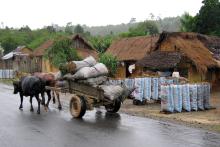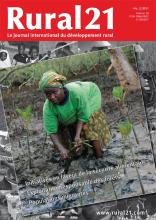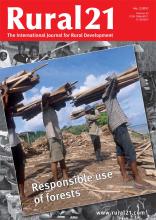Land Library
Welcome to the Land Portal Library. Explore our vast collection of open-access resources (over 74,000) including reports, journal articles, research papers, peer-reviewed publications, legal documents, videos and much more.
/ library resources
Showing items 1 through 9 of 11.Fuelwood and charcoal continue to be indispensable in cooking the daily meal for most people in sub-Saharan Africa; in addition, wood as a fuel represents an important source of income.
L’importance des forêts pour atténuer le changement climatique et favoriser la conservation des espèces, comme moyen de stockage de l’eau, de production d’oxygène, de protection du sol et comme source d’humus, est bien connue.
Le Partenariat pour les Forêts du Bassin du Congo vise à concilier la protection des écosystèmes forestiers et leur utilisation pour le développement des pays d’Afrique centrale. Cet article présente ce qu’un «réseau stratégique» de ce type peut donner comme résultats, ainsi que ses limites.
Dans les pays en développement, le secteur des combustibles bois constitue une importante source d’énergie, qu’il s’agisse du bois de chauffage ou du charbon de bois, et de moyens d’existence pour les pauvres vivant en milieu rural, aussi bien en termes de création d’emplois que de génération de
The importance of forests for climate change mitigation and species conservation, as water stores and oxygen producers, soil protectors and humus providers, is well known. However, over 13 million hectares of forest are lost each year, mainly in the tropics.
Certification is viewed as one of the most effective ways of curbing unregulated logging and conserving natural forests in the tropics. In the meantime, there are several dozen certifying organisations.
The Congo Basin Forest Partnership aims to reconcile forest conservation with forest use. This article explains what a “policy network” of this sort can achieve and where its limits lie.
Against the backdrop of increasing deforestation in Natural Protected Areas due to illegal logging and shifting agriculture, the Peruvian association DRIS has implemented a programme in three districts of the country.
Every year, 13 million hectares of forest are lost worldwide; that is an area the size of Austria and Switzerland combined. 90 percent of this deforestation involves tropical forests.



